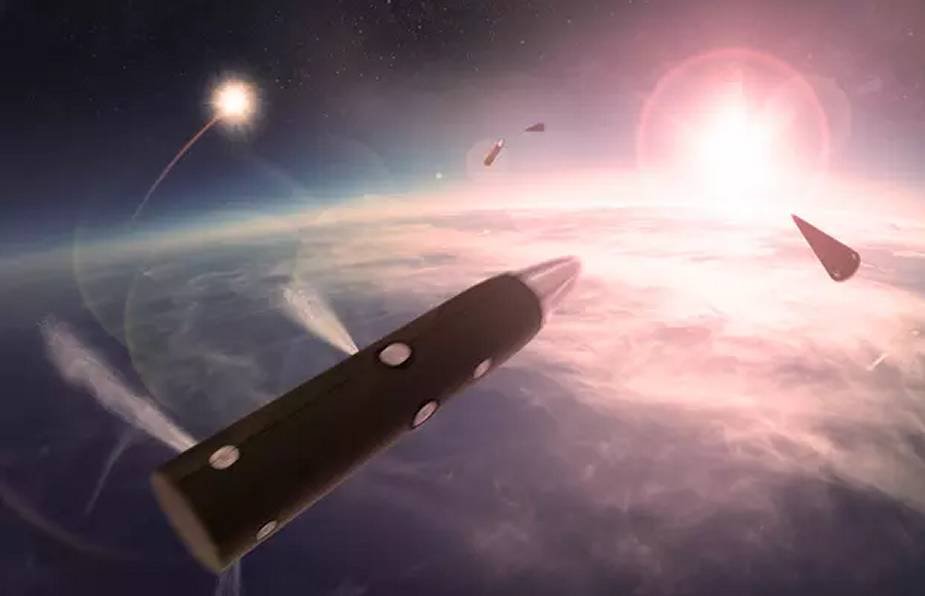
BAE Systems to deliver advanced ballistic missile seekers for US THAAD air defense
BAE Systems has received a contract from Lockheed Martin to design and manufacture next-generation infrared seeker technology for the Terminal High Altitude Area Defense (THAAD) interceptor missile. The THAAD seeker provides critical sensing and guidance capabilities that help protect the U.S. and global allies from ballistic missiles.
“THAAD is a highly effective system for mitigating high-speed missile threats and we’re making it more capable,” said Greg Procopio, director of Precision Guidance and Sensing Solutions at BAE Systems. “We’re anticipating the capabilities of tomorrow’s ballistic missiles and designing adaptable electronic systems to counter those threats.”
 Guided by BAE Systems’ infrared technology, THAAD interceptors engage ballistic missiles and destroy warheads with kinetic force in or out of the atmosphere. The seeker design is informed by BAE Systems’ expertise in precision munitions, electronic warfare systems, and small form factor electronics, as well as its extensive knowledge of the threat environment.
Guided by BAE Systems’ infrared technology, THAAD interceptors engage ballistic missiles and destroy warheads with kinetic force in or out of the atmosphere. The seeker design is informed by BAE Systems’ expertise in precision munitions, electronic warfare systems, and small form factor electronics, as well as its extensive knowledge of the threat environment.
BAE Systems’ THAAD Seeker is an integral part of the THAAD guidance system, using its advanced sensors to “seek” and lock onto incoming targets – enemy ballistic missiles moving up to 17,000 miles per hour – so that the guidance system can route the THAAD interceptor to the threat. As escalating security threats around the world have spurred the modernization of defense systems to deter aggression, BAE Systems has continually improved its sensor designs to advance the performance of both precision-guided munitions (PGM) and electronic warfare (EW) systems.
THAAD’s high-altitude intercept capability mitigates the potential effects of enemy intermediate- and short-range ballistic missiles – even hypersonic versions – before they reach the ground, and its non-explosive, hit-to-kill kinetic impact minimizes risk of detonation. As a worldwide leader in military and intelligence sensor technologies for over 40 years, BAE Systems is performing cutting-edge sensor design work that enhances guidance capabilities and improves the THAAD missile defense system’s ability to neutralize more threats while optimizing manufacturability.
A ballistic missile’s altitude, speed, and range demand accurate design, testing, and evaluation. BAE Systems’ THAAD seekers are assembled, integrated, and tested by a dedicated team of Precision-Guided Munitions (PGM) sensor development engineers at multiple locations.
BAE Systems has received a contract from Lockheed Martin to design and manufacture next-generation infrared seeker technology for the Terminal High Altitude Area Defense (THAAD) interceptor missile. The THAAD seeker provides critical sensing and guidance capabilities that help protect the U.S. and global allies from ballistic missiles.
“THAAD is a highly effective system for mitigating high-speed missile threats and we’re making it more capable,” said Greg Procopio, director of Precision Guidance and Sensing Solutions at BAE Systems. “We’re anticipating the capabilities of tomorrow’s ballistic missiles and designing adaptable electronic systems to counter those threats.”
Guided by BAE Systems’ infrared technology, THAAD interceptors engage ballistic missiles and destroy warheads with kinetic force in or out of the atmosphere. The seeker design is informed by BAE Systems’ expertise in precision munitions, electronic warfare systems, and small form factor electronics, as well as its extensive knowledge of the threat environment.
BAE Systems’ THAAD Seeker is an integral part of the THAAD guidance system, using its advanced sensors to “seek” and lock onto incoming targets – enemy ballistic missiles moving up to 17,000 miles per hour – so that the guidance system can route the THAAD interceptor to the threat. As escalating security threats around the world have spurred the modernization of defense systems to deter aggression, BAE Systems has continually improved its sensor designs to advance the performance of both precision-guided munitions (PGM) and electronic warfare (EW) systems.
THAAD’s high-altitude intercept capability mitigates the potential effects of enemy intermediate- and short-range ballistic missiles – even hypersonic versions – before they reach the ground, and its non-explosive, hit-to-kill kinetic impact minimizes risk of detonation. As a worldwide leader in military and intelligence sensor technologies for over 40 years, BAE Systems is performing cutting-edge sensor design work that enhances guidance capabilities and improves the THAAD missile defense system’s ability to neutralize more threats while optimizing manufacturability.
A ballistic missile’s altitude, speed, and range demand accurate design, testing, and evaluation. BAE Systems’ THAAD seekers are assembled, integrated, and tested by a dedicated team of Precision-Guided Munitions (PGM) sensor development engineers at multiple locations.


